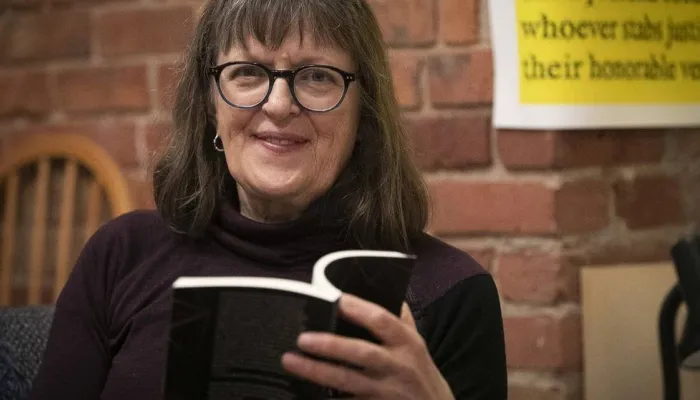Bänoo Zan
Biography
Bänoo Zan is a self-exiled poet, librettist, translator, teacher, editor and poetry curator, with numerous published pieces and three books. Songs of Exile was shortlisted for Gerald Lampert Memorial Award. Letters to My Father was published in 2017. She uses symbolism, oxymorons and allusions to myth, religion, and culture and has been called a political, metaphysical, and spiritual poet. Zan has been influenced by classic and contemporary Persian poets as well as their counterparts in English, including Hafez, Rumi, Forough Farrokhzad, Ahmad Shamlou, Sohrab Sepehri, Shakespeare, John Donne, Sylvia Plath, and Adrienne Rich. She is the founder of Shab-e She’r (Poetry Night), Toronto’s most diverse poetry reading and open mic series (inception: 2012).
Bänoo calls herself a war-correspondent-in-verse: Self-exiled poet covers Iran protests as a 'war correspondent in verse' | CBC Radio
Bänoo, along with Cy Strom, is the co-editor of the poetry anthology: “Woman Life Freedom: Poems for the Iranian Revolution." She is the recipient of the 2025 Writers’ Union of Canada Freedom to Read Award.
Micro-interview
I read a lot of poetry in high school. I loved many poems by numerous classic and contemporary Persian poets.
I cannot honestly remember what it was that drew me to poetry. Was it in my blood as it is in many Iranians' blood? In some regions in Iran, like Khorasan and Fars, almost everyone has written at least a few lines. Poetry has always been a significant component of Persian Literature textbooks in our school system. Even some people who cannot read and write know lines of poetry by heart!
Poetry has influenced music and calligraphy. It has influenced the kings and the clergy. It has influenced ordinary people and filled their lives with meaning and beauty. Poetry is an integral part of our secular and religious rituals and celebrations.
No one encouraged me to read poetry. No one needed to. In Iran, anyone interested in reading is interested in poetry! Poetry is the main genre. It is political, social, subversive, revolutionary, erotic, spiritual, pious, conservative upholder of our complex culture, and more. Poets have had the honour to go to jail for what they have written. When dissident poets release new work, it is shared widely on social media. Poetry is feared and revered.
We worship our poets like saints. Hafez is treated like a divine figure.
Poets make a difference.
Poetry matters.
I started writing poetry at the age of ten, but I didn't call myself a poet before I was in my 30s (I think), maybe even later!
Like anyone interested in writing, at first I imitated the poets I read. I did not intend to do so, but it is what happens before you come into your unique voice.
Years later, I felt I was writing from a more authentic place. That is when I started to claim the title.
A poet does not follow other people. A poet does not follow herself.
A poet listens to people and listens to herself and listens to the world.
A poet speaks with urgency.
The poet's job is to be honest with herself
The poet's job is to be herself
in words
in life
and after!
"Kubla Khan" by Samuel Taylor Coleridge
I studied English Language and Literature at Iranian universities. We covered many poets and writers in B.A. and M.A. I kept on discovering many more. Later, when I started teaching English at universities, I had the opportunity to rediscover some of them in a new light.
Coleridge fascinates me perhaps because he is the closest in style to Rumi: musical and mystical, wondering and wandering, spiritual and complex.
I would have chosen “The Rime of the Ancient Mariner” if it had been included in your anthology. Now, that is a poem that speaks to my heart. It tells the story of displacement and exile and the guilt that comes with it. It tells of struggle that never ceases. It tells my story.


